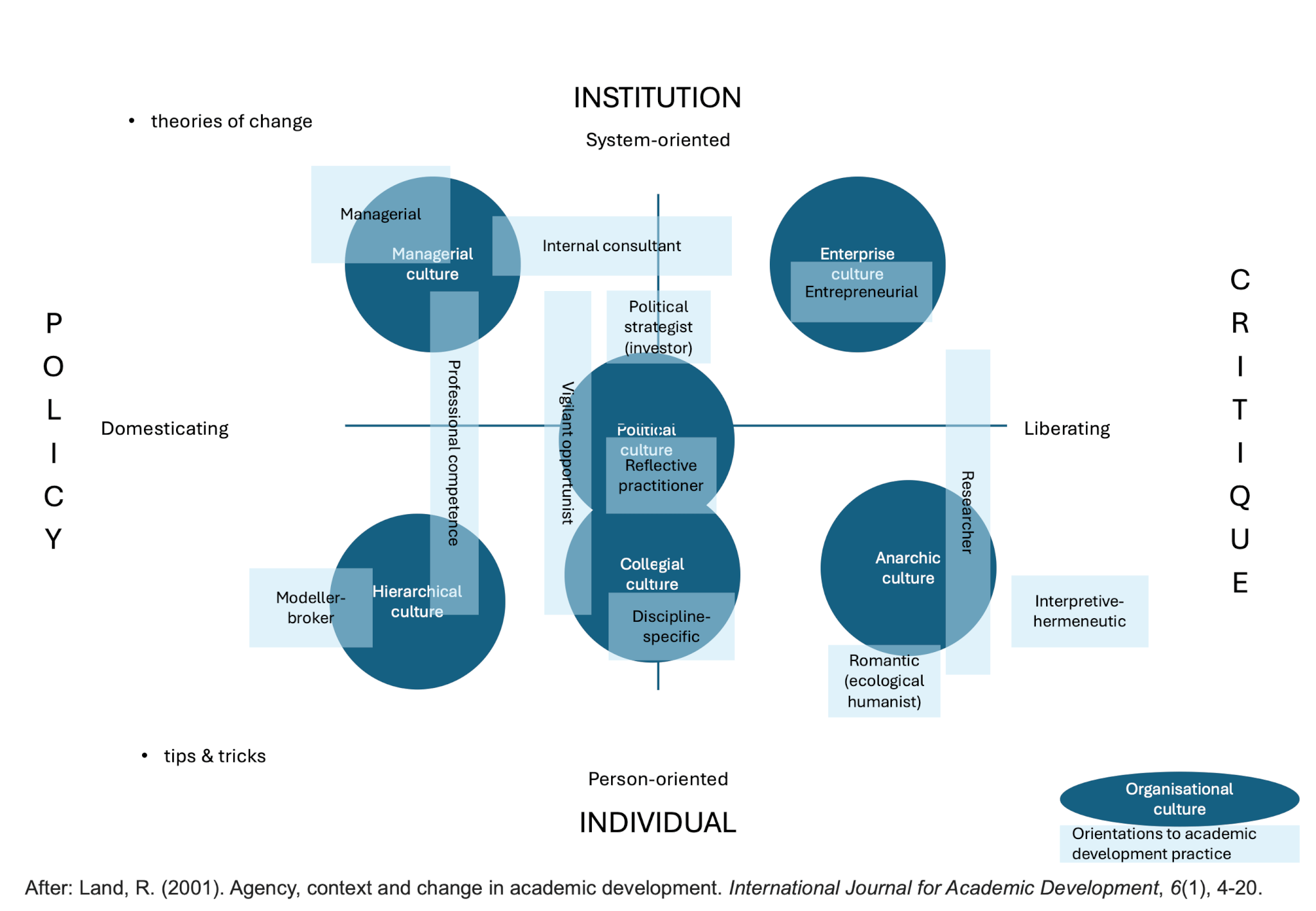
Thinking about “Agency, context and change in academic development” (Land, 2001)
I recently rediscovered the article by Land (2001) on how different orientations to academic development can be put into relation to each other. And I find it so helpful to think in those terms to understand better why some colleagues do what they do!
In a nutshell, take the figure above, which is my simplified version of a figure in Land (2001). There are two axes: domesticating-vs-liberating and person-vs-system-oriented. Just based on those two axes, I would place myself in the bottom right corner: Very much focussed on the individual and on liberating (even though that is a fairly new word in my active vocabulary, and only came in through the “Liberating Structures“). Also looking into the descriptions of orientations of academic developers in that corner, those resonate with me a lot. The “romantic” is about “personal development, growth and well-being of individual practitioners within the organization” (which I would say is a fair description of what I value!), the “researcher” “sees most effective way of influencing colleagues’ practice as being through presentation of compelling educational research evidence” (don’t know if I would subscribe to the “most effective way”, but I think that it is definitely a good way), and the one to the far right (where I cannot even explain what those words mean…) is about “‘intelligent conversation’ with colleagues in which balancing of different views, relation of local to wider perspectives, part to whole, etc. leads to critical synthesis and production of new shared insights and practice” (which all sounds super fancy, but I believe in conversations to co-create meaning and shared insights). So that’s definitely my home corner!
And locating some of my colleagues, too, this explains several “conflicts” (which sounds maybe more dramatic than it was. I just didn’t understand why they put their focus where they put it) I have been having recently: Some colleagues are very much in the top left corner, focussed on the system and on domesticating teachers (although I do appreciate the “theories of change” approach, I find it extremely frustrating when people focus on what is good for some vague idea of an idealized institution over very concrete teachers we are working with and could help, but then sacrifice for the greater good [ok, I might be getting a bit dramatic here]), and other colleagues that are focussed on the individual teachers like me, but that are very much in the “do as I do” domesticating corner (which, even though they might be brilliant teachers and role models, I find really condescending. Who do we think we are to tell people what to do, to try to mold them into our ideal version of a teacher, rather than supporting them to the best of our abilities to become who they want to become, and maybe supporting that using research on what has worked for others?). I do appreciate tips & tricks, but they should always be given and taken with a pinch of salt, and a very big BUT MAKE SURE IT FITS YOU AND YOUR CONTEXT disclaimer. I couldn’t really pinpoint the source of the tensions before reading the article, but now I see what the different underlying values and goals are, which makes it easier to have conversations.
One important point to also make is that an educational developer might well adopt different orientations depending on context and purpose, and I do see the importance of sometimes thinking about the system, or to sometimes focus on development of professional competences, and I have done both. And in an academic development unit, we probably need all flavors and approaches for different purposes. But I think it would be super helpful for all my colleagues to think about where they are each located, and to use that as a basis for discussion about goals and strategies, and also distribution of tasks and roles. Maybe some day we will?
Land, R. (2001). Agency, context and change in academic development. International Journal for Academic Development, 6(1), 4-20. DOI: 10.1080/13601440110033715